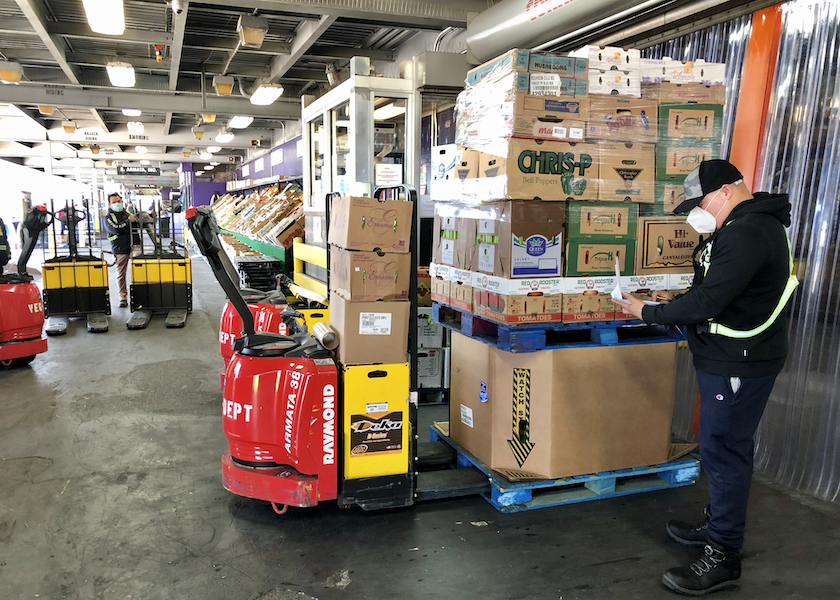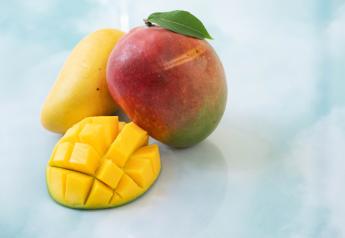Business strategies in today’s NYC market

BRONX, N.Y.— Many Hunts Point produce companies still operating in today's business climate are working faster and more efficiently with different types of customers and product sizes to survive — and sometimes thrive.
Canyon Sales Co. has purveyor customers that had never packaged items for retail, and now they’re doing direct-to-consumer delivery, said Lou Getzelman Jr., who handles receivers and transportation.
“Our customers have had to completely reinvent themselves and their business,” he said.
Before the pandemic hit, D’Arrigo New York was planning to beef up its social media presence and use LinkedIn and other online hiring platforms to source new employees, especially drivers, from a pool of people outside the Hunts Point world.
“Those focuses we started to implement became very, very handy throughout COVID,” said Gabriela D’Arrigo, vice president of marketing and communications.
“Drivers are tough to come by. Through these platforms, we were able to reach new people outside of the usual suspects.”
D’Arrigo New York had roughly 80% retail and 20% foodservice customer base, so it adjusted to the changes in demand several ways, such as finding new locations to make drops.
Restaurants that repurposed into small grocery retailers and pop-ups in food deserts were new sources, she said.
“Seeing some restaurants turn themselves into mini-wholesale markets themselves, I think that will definitely be something that will affect the overall distribution of produce throughout the city,” D’Arrigo said.
Thanksgiving is usually one of the busiest times of year for Hunts Point market, and it still could be busy, relative to the rollercoaster dives in consumer demand that wholesalers have ridden along with the sharp rises.
“The demand has been up and down — the only consistency is the inconsistency of the buying trends brought on by COVID,” said Sasha LoPresti, chairwoman of the Hunts Point Produce Market Public Relations Committee.
“Although we have learned to adapt, we are still bracing for an unpredictable close and start of the year.”
Retail volume isn’t being projected as accurately as in the past, agreed Michael Armata, berry buyer and salesman for E. Armata Fruit & Produce at Hunts Point.
“It’s nerve-wracking,” Armata said. “Service is more important than ever. Customers have more questions. They don’t know what the demand is right now.”
Being nimble and agile has been key to keeping up with all the fluctuations, D’Arrigo said.
“As wholesalers, it’s kind of our forté to function and change on the fly. So, we’re kind of in our element, as weird as that sounds, but we’ve been able to keep things going, keep things moving,” D’Arrigo said.
“And if anything, COVID has shown the importance of wholesalers being posted on pretty much everything, from growing to retail to foodservice or even lack thereof, that we know what we’re talking about and are experts in this field.”
Almost overcommunicating with customers, she said, helps with navigating this guessing game.
One of the fastest growing sectors of business is independent supermarkets and delivery service in general.
“Our delivery orders are through the roof. We have to keep getting more trucks,” Armata said.
The unique needs of independent retailers, whether brick-and-mortar or online, are what wholesalers like them are best used for, said Stefanie Katzman of S. Katzman Produce.
“They have less staff, less storage space. We deliver it to them,” Katzman said. “Online shopping, for us, it’s another customer. New online delivery services have helped us, probably because they need our expertise.”
Being consistent and reliable in an unpredictable market are some of the most valued attributes a New York City company can have, business leaders say.
“It’s really that reliability that helps build that partnership with our customers, and it’s those same partnerships with our shippers,” Katzman said.
“Being that cog in the supply chain that really helps get the food where it needs to be.”
The scariest time during March and April may have leveled off, but New York produce leaders are still being vigilant as they conduct business — because winter is coming and a possible coronavirus resurgence, whether or not there’s a vaccine.
Joel Fierman said Fierman Produce Exchange had to adapt rapidly, and about 80% of its business is retail now.
“We figured out real quick that institutional packages and specialty items are not what people are looking for, so we have been practicing selling more conventional items. Revenue is down, but we are financially solvent,” Fierman said.
On the positive side, Hunts Point companies have had more than nine months to get pandemic-related systems and processes in place for any future outbreaks.
“As far as really being able to predict what happens, in terms of COVID, it’s almost foolish to say you’ve got a grasp on it. But what we’re doing is just our best educated guess. Using the information that we have is all we can really do,” D’Arrigo said.
At Nathel & Nathel, fruit procurement buyer Joshua Gatcke is focusing on overhauling the company’s Instagram account to connect with the more tech-savvy customer base using this medium.
There will still be people who want to see the product and salespeople in person, but there are a lot more independent, small home-delivery businesses since the pandemic started, he said.
“For them, their platform is Instagram. That’s how they connect with their customers, and I’ve found it effective,” Gatcke said.
“It’s just a different way to promote and advertise the market and our company. We pride ourselves on having the absolute best quality stuff, and we get to show that off to a bigger audience than just those who come to Hunts Point.”
Social media can help drive sales.
“It’s not going to be your biggest driver of sales, but it’s something. It’s pretty cool,” Gatcke said.
“You have to post high quality, eye-catching photos and you have to be posting frequently. Now we’re making it a priority to be consistent with it.”
This is part of the Nathel & Nathel strategy to be proactive rather than reactive — to modernize.
The company is also trying to add suppliers and products.
“Packaged products are so big, and we leaned into that. We added Little Leaf Farms. We got to see their operations, and it was awesome. It’s all automated, essentially completely contactless from seeding to harvest to packaging.”
As for winter, people tend to stay home more during snow storms anyway, even in New York City, and eat at home.
“If anything, we’ll do what Hunts Point always does, and we’ll have more than enough product. And whatever is left over, we’ll be sure to disperse that product appropriately and donate it to people who need access to that food,” D’Arrigo said.
“That’s what we’ve always done, so we’re going to lean on that pretty heavily this year.”







